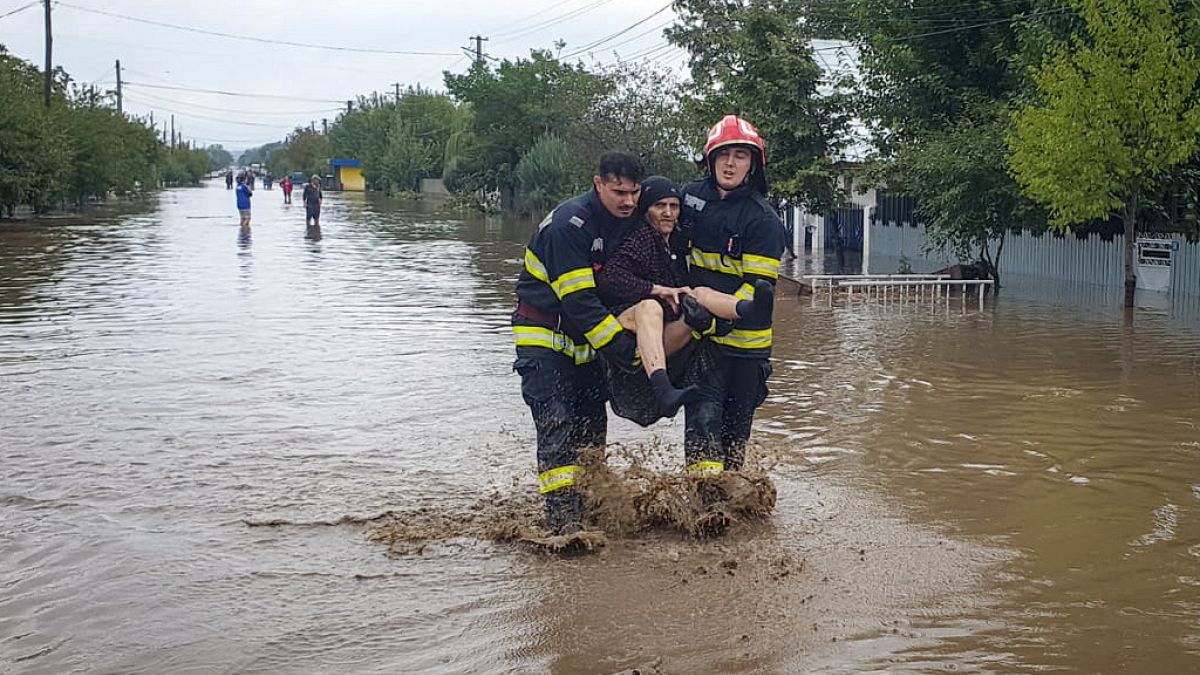Four dead and dozens stranded after torrents hit eastern Romania

Rescue services also rushed to save 95 people in the hard-hit eastern counties of Galati and Vaslui.
Four people were killed in floods in eastern Romania as rainstorms left scores stranded, emergency authorities reported on Saturday.
Rescue services worked urgently to save 95 people in the heavily affected eastern counties of Galati and Vaslui.
The bodies of the four who died were discovered in the localities of Pechea, Draguseni, Costache Negri, and Corod, according to the Department for Emergency Situations, which did not provide details on how exactly they died. A fifth body that was found was determined not to have been killed by the flooding.
Emergency authorities released video footage showing a team of rescuers evacuating an elderly man on a small lifeboat before carrying him to safety.
The storms battered 19 localities across eight counties in Romania, with strong winds downing dozens of trees that damaged cars and blocked roads. Authorities sent text message alerts to residents, warning them of the adverse weather as emergency services rushed to remove floodwaters from homes. Some roads have also been closed.
Romania’s environment minister Mircea Fechet told The Associated Press Saturday that, in some of the badly flooded areas, more than 160 liters of rain fell per square meter which he said is a rare occurrence. “What we are trying to do right now is save as many lives as possible,” the minister, who was on his way to Galati to assess the situation, added.
Local media posted videos on X showing the extent of the flooding in Pechea county.
Meanwhile, other central European countries are bracing for severe flooding, which is forecast to hit Poland, Hungary, Slovakia, the Czech Republic, Austria and Germany over the weekend.
Czechs prepare for ‘worst case scenarios’
Czech authorities erected metal barriers or protective walls from sandbags, while water was released from dams to make space in reservoirs.
Residents have been warned to get ready for possible evacuations.
“We are currently making preparations for a possible rise in the water level of the local river, so this is a precautionary measure. As in most places,” said Aleš Chovanec, Deputy Commander of the Holasice Volunteer Fire Brigade.
Some public events planned for the weekend have been cancelled at the request of authorities, including football matches in the top two leagues.
“We have to be ready for the worst case scenarios,: Prime Minister Petr Fiala said after a meeting of his government’s central crisis committee. “A tough weekend is ahead of us.”
Meteorologists say a low pressure system from northern Italy was predicted to dump much rainfall in most parts of the Czech Republic including the capital and border regions with Austria and Germany in the south, and Poland in the north.
Central Europeans are especially wary because some experts have compared the weekend forecast to devastating floods in 1997 in the region, referred to by some as’ the flood of the century.’
Over 100 people were killed in the floods 27 years ago, including 50 in the eastern Czech Republic where large sections of land was inundated.
The biggest rainfall was predicted in the eastern half of the country, particularly in the Jeseniky mountains. The second largest city of Brno, located in eastern Czech Republic, is among places that have not had flooding protection work completed, unlike Prague.
Czechs were asked not to go to parks and woods as high winds of up to 100 kilometres per hour were forecast.
Poland and Austria also prepare for flooding
In Poland, Prime Minister Donald Tusk travelled to the southwestern city of Wrocław where floods are forecast.
Authorities there have appealed to residents to stock up on food and to prepare for power outages by charging power banks.
Tusk, meeting with firefighters and other emergency officials, said the forecasts were “not excessively alarming.”
“There is no reason to panic, but there is a reason to be fully mobilised,” he stressed.
The German Weather Service warned of heavy precipitation across swaths of the country, including the Alps, where heavy snowfall and strong winds are expected at higher altitudes.
The Alpine nation of Austria is also getting ready for heavy rains, and a massive cold front that is expected to bring snow to higher elevations.
“I think that we have learnt a lot from the floods of 2002 and 2013. We have of course also made all the necessary investments. I’m thinking of flood protection, where numerous projects have been implemented and of course also in the whole area of data analysis,” said Johanna Mikl-Leitner, the regional governor of Lower Austria.
The change in weather has come following a hot start to September in the region.
Scientists recorded Earth’s hottest summer on record, breaking a record set just one year ago.
And a hotter atmosphere, driven by climate change, can lead to more intense rainfall.
Related
A New Book Argues That What Happens in Europe Doesn’t…
Remaking the World: European Distinctiveness and the Transformation of Politics, Culture, and the Economy by Jerrold Seigel “No issue in world
Poland plans military training for every adult male amid growing…
Poland’s prime minister, Donald Tusk, has said his government is working on a plan to prepare large-scale military training for every adult male in response t
2025 European Athletics Indoor Championships: Ditaji Kambundji secures women’s 60m…
Switzerland’s Ditaji Kambundji walked away from the 2025 European Athletics Indoor Championships in Apeldoorn on 7 March with much more than her first Europea
Takeaways from the EU’s landmark security summit after Trump said…
BRUSSELS (AP) — European Union leaders are trumpeting their endorsement of a plan to free up hundreds of billions of








